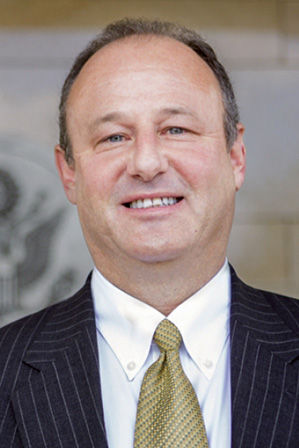The End of an Era: What Lies Ahead?
President’s Views
BY ERIC RUBIN

The end to America’s 20-year war in Afghanistan brought a wave of emotion, sadness and anxiety to thousands of our colleagues, both active-duty and retired—those who served there, those who worked on Afghanistan policy and assistance, and those who participated in the whole-of-government effort to protect our country from another 9/11.
I am writing this only days after the end of our diplomatic and military presence in Afghanistan, in the wake of the tragic deaths of 13 U.S. service members and more than 170 Afghans outside the gates of Kabul airport. Most of the 13 were too young to remember 9/11 or the reasons our country went to war in Afghanistan and then committed to a massive civilian reconstruction effort.
They were doing their duty to help others escape from a dangerous and unstable situation, risking their lives in service to others and to their country. There is no greater sacrifice. We honor them, and offer our heartfelt condolences to their families, fellow service members and friends.
In many respects, this tragic moment is a turning point for our country, our role in the world and our Foreign Service. It concludes both the massive focus on post-9/11 counterterrorism that, while essential, changed and altered so much of our engagement and diplomatic outreach across the globe. It brings a coda to the immediate post–Cold War period, 30 years in which our country has lost sole superpower status but has not yet found or defined its role in the new multipolar world.
The era of “expeditionary diplomacy” and the idea that we were “the world’s indispensable nation” changed our foreign policy and, by extension, our Foreign Service. In the case of our Service, many of the changes had unpredicted but indisputably negative effects.
For the first time since the Vietnam War, a substantial portion of our colleagues have served overseas in unaccompanied danger posts, some for years at a time.
Extensive exposure to the U.S. military in combat conditions led to a slow militarization of Foreign Service culture, with less room for constructive debate and dissent in policy recommendations.
When I joined in 1985, I would have been laughed at if I called my office director, deputy assistant secretary or deputy chief of mission “ma’am” or “sir.” Titles were reserved for only the most senior officials, and everyone else was on a first-name basis. A small thing, perhaps, but one that reflects broader cultural change.
We have also become a less family-friendly and tandem-friendly Service, and this has helped fuel our ongoing loss of talented colleagues who can’t make the career work for their spouses and families in the modern world.
And we have become a much more domestic Service, with the highest proportion of our colleagues serving in the U.S. since the creation of the modern Foreign Service—a trend greatly accelerated by our drawdowns in Iraq and Afghanistan. Almost none of those positions has been given back to the embassies and consulates from which they were initially taken as part of the so-called Iraq (and Afghanistan) tax.
Our country no longer has the world’s leading diplomatic and foreign assistance presence, which it had from 1945 until recently. This shift portends a more contested and dangerous diplomatic landscape ahead. We cannot keep doing more with less, and we cannot get the job done properly for the American people and their elected leaders if we don’t have the people, positions, training and support we need to get it done.
In parts of the world, we have been understaffing our embassies and consulates for the past 30 years. We are spending about half, in real-dollar terms, on diplomacy and foreign assistance compared to 1989. That kind of cut has consequences that cannot be denied or swept under the rug any longer.
Our country needs strong diplomacy and strong foreign assistance to maintain, redefine and focus our efforts on the world stage. With the right resources, our Foreign Service is ready to do its part to help our country navigate this painful and challenging turning point.

